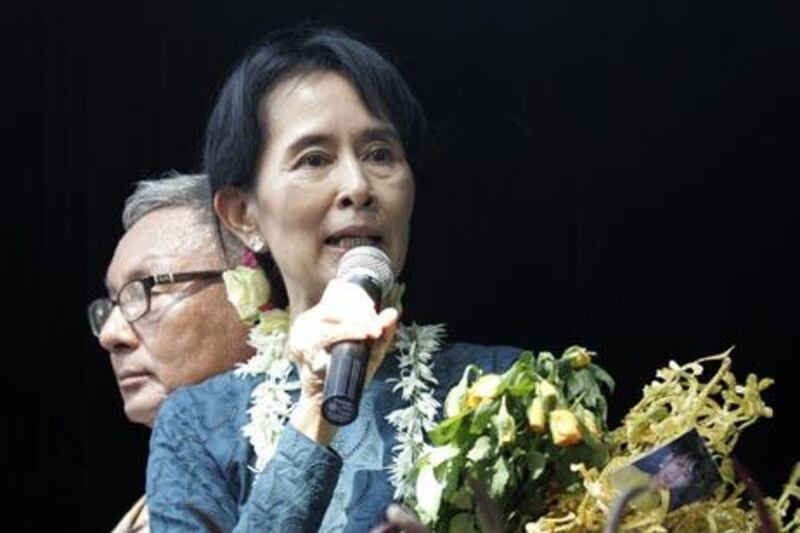PARIS // World leaders hailed the release of Myanmar's democracy icon Aung San Suu Kyi from years of house arrest Saturday but warned the country's junta not to restrict her, even as a senior government official insisted she was "completely free."
President Barack Obama said that "while the Burmese regime has gone to extraordinary lengths to isolate and silence Aung San Suu Kyi, she has continued her brave fight for democracy, peace, and change in Burma.
"She is a hero of mine and a source of inspiration for all who work to advance basic human rights in Burma and around the world," said Obama in a statement, using the country's former name.
While the U.S. welcomed Suu Kyi's release, it was "time for the Burmese regime to release all political prisoners," added Obama, in Japan for a regional summit, echoing sentiments aired by other world figures.
Obama's predecessors, former US presidents George W. Bush and Bill Clinton, similarly welcomed her release, with Clinton saying he hoped it pointed to a "new direction" for Myanmar.
UN secretary-general Ban Ki-moon called Suu Kyi "an inspiration" to the world, a UN spokesman said.
"The secretary-general expects that no further restrictions will be placed on her, and he urges the Myanmar authorities to build on today's action by releasing all remaining political prisoners," said the spokesman.
In Oslo, the Norwegian Nobel Committee invited Suu Kyi to make the traditional acceptance speech the Nobel Peace laureate was prevented from giving in 1991, the NTB news agency reported.
And in France, where supporters gathered in front of Paris city hall to celebrate her release, President Nicolas Sarkozy warned that "France will be extremely attentive to the conditions in which Madame Aung San Suu Kyi enjoys her refound liberty".
Any "restrictions on her freedom of movement and expression would constitute a new unacceptable denial of her rights," he said in a statement.
But a senior Myanmar official said no conditions were tied to Suu Kyi's release. "She is completely free--there are no conditions at all," the official said on condition of anonymity.
UK Prime Minister David Cameron called her release "long overdue," branding her detention for 15 of the last 21 years a "travesty, designed only to silence the voice of the Burmese people.
"Freedom is Aung San Suu Kyi's right. The Burmese regime must now uphold it," Cameron said.
The UK is the former colonial power in Myanmar, which achieved its independence as Burma in 1948, and Suu Kyi's late husband was British.
Desmond Tutu, chair of the group of retired senior statesmen known as The Elders, called Suu Kyi "a global symbol of moral courage" and said her release "offers hope to the people of Burma".
For his part, Surin Pitsuswan, secretary-general of the Association of Southeast Asian Nations (ASEAN) which includes Myanmar, told AFP he was "very, very relieved" at the news.
Pitsuswan said he hoped Suu Kyi would be able to play a role in bringing national reconciliation, while the Japanese government urged Myanmar to take "further positive measures."
In Brussels, European Commission head Jose Manuel Barroso called for Suu Kyi to be granted "unrestricted freedom of movement and speech" so she could "participate fully in her country's political process." He echoed the call for the release of political prisoners.
Similar reactions came from German Chancellor Angela Merkel, Australian Prime Minister Julia Gillard and the governments of Poland, Italy, the Czech Republic, Austria, Bulgaria, Sweden, Canada and South Africa.
In Geneva, UN Human Rights Commissioner Navi Pillay called Suu Kyi's release "a positive signal" by Myanmar authorities and said she could "make a major contribution" in the transition to democracy and national reconciliation.
"I urge the authorities of Myanmar to now release the other 2,200 political prisoners as a clear sign that the new government intends to respect human rights and forge a new future for the country," Pillay said.
China, one of Myanmar's closest allies and a mainstay for the junta through trade ties, arms sales, and using its veto on the UN Security Council against sanctions, had no immediate reaction.
But the official Xinhua news agency, reporting her release, did describe Suu Kyi as "a noted political figure."
Europe's top rights body, the 47-member Council of Europe, welcomed her release as "an important day for human rights defenders worldwide."
Other rights groups also hailed the news, but were deeply skeptical over the Myanmar junta's motives and the prospects for democracy in the country.





